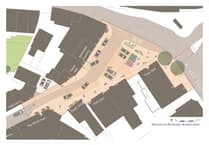Concerns have been raised for commuters, visitors and residents in Bath unable to afford less polluting cars as the council introduces emissions-based car park charges.
From September, the cost of leaving your car in a car park in the city centre will depend on how much pollution your engine emits, as Bath and North East Somerset Council aims to discourage the driving of polluting vehicles in the centre with the aim of improving air quality.
Drivers of electric cars and the least polluting petrol cars will continue paying the current rate, but anyone who drives diesel or a car which emits more than 131g of CO2 per kilometre will pay extra.
The council’s parking services team manager Andrew Dunn told the council’s Climate Emergency and Sustainable Policy Development and Scrutiny Panel on June 6th: “The focus of the proposals is about pedestrian safety.”
He added: “They are designed to reduce pollution to protect the most vulnerable. They are also designed to incentivise the displacement of more polluting vehicles from our city centre to more sustainable alternatives, such as the park and ride sites, and in these cases the prices will remain unchanged. This will also help to reduce congestion on the network.
“Of course any reduction in emissions from the tailpipe of a vehicle will also have a beneficial impact on the climate emergency as well, but that is not the core reason for these proposals.”
He also added: “This is not about raising revenue.”
But Moorlands councillor Jess David said: “I have some concerns about the cumulative impact on households across [Bath and North East Somerset] with the emissions based parking charges applying to residents parking zones and to car parks. You know how these things add up.”
She added: “It notes in the annex that it may be that lower income households may have an older car which emits more carbon dioxide, so therefore they will be increasingly paying these charges.
“So I think it’s important for the council to look at that so that we can think about what we can do to better support these people, whether there’s targeted schemes to help them upgrade their vehicles or whether there’s any other way to soften the impact of these well-intended schemes.”
Mr Dunn said that they would look at this further. He said: “It’s a modest increase of 11p per hour on average but, yes, disproportionately those less able to change their vehicles will be affected.”
Under the plans, the amount it costs to park a car will increase with how many grams of CO2 per kilometre it produces. All diesel cars — even the least polluting — will pay at least another 50p than they do currently.
Draft versions of the new signs to be installed at pay and display car parks state that a two hour stay will cost “£3.40 up to £4.60” but the proposed charges listed in another council document suggests that the most polluting vehicles — those with a diesel engine over 2951 cc — would actually pay ten pence more than that.
Oldfield Park councillor Ian Halsall asked what was being done to ensure people were not confused, or without the right money. He said: “I don’t know what my emissions are. I’m sure many people don’t know what their emissions are.”
Mr Dunn said: “It is really complex and the last thing we want to see is customers frustrated when they come into the car park.”
He added that people would not need to know the emissions of their vehicle, just their number plate, as the parking machines or MiPermit would use DVLA lookup to check the emissions of their vehicle and tell people how much they would be charged.
Mr Dunn said: “A visitor planning to come to Bath from […] can already find out their parking charge in advance, helping them to steer them to those sustainable options because, really, we want them at the park and ride.”
Vehicles not registered with the DVLA, such as foreign-registered cars, would be charged the top rate; but if the DVLA cannot be accessed due to a system error, all cars would be charged the lowest rate.
Commenting on the proposal to charge the top rate to foreign registered cars, Lambridge councillor Saskia Heijtjes said: “I don’t have a problem with this but I think communication around this is very important.”
She added: “You can imagine a visitor from mainland Europe coming with an electric car and being really surprised at how much they have to pay.”
Mr Dunn said that the council would be putting information on the website and was working with Visit Bath to make more people coming to the city aware of the planned changes. He added that the council had data on regular uses of the city’s car parks and was engaging with them.
Mr Dunn said: “Not only will they be aware of the charges, they will have an opportunity to give their views as well.”
An online consultation on the plans is set to run from July 6th to July 27th.
LDRS, John Wimperis



